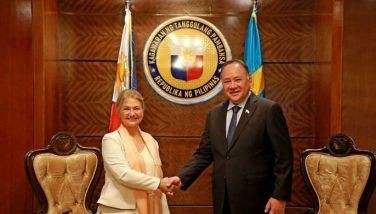Street protests jolt Myanmar junta
BANGKOK (AFP) - Two rare protests against a massive hike in fuel prices have alarmed Myanmar's ruling junta, recalling the early days of a 1988 uprising that toppled the previous military regime, analysts said.
Reports of the street marches, with protesters defying stiff warnings from the junta to rally twice within a week, have made headlines around the world, shining a spotlight on the generals' secretive regime.
"They are always worried they are sitting on a chair and that this chair is shaking," said Myanmar analyst Aung Naing Oo.
"They should be worried, because what we are seeing is a similar event to the precursor to the '88 uprising," he told AFP.
Angered by fuel price rices that doubled transport costs overnight, about 500 people joined a first march Sunday led by the pro-democracy 88 Generation Students group on the northern outskirts of Yangon.
At least 13 leaders of that march were arrested in overnight police raids Tuesday, but it failed to stop another 150 people staging a new march the next day.
The government rarely admits to arrests of political prisoners, but in an unusual move state media ran detailed reports about the detentions just hours later.
The official New Light of Myanmar spaper accused the group of plotting to instigate nationwide protests, warning the uprising could be "similar to the '88 disturbances."
Analysts agree it is too soon to say if this week's protests will snowball into anything bigger, but clearly the junta has been set on edge.
"They are worried, that's why they made an announcement in the newspaper," said Myanmar analyst Win Min.
"Anybody who was likely to lead the demonstrations was arrested," he said. "They are worried it will lead to a bigger demonstration like in '88. They are paranoid."
The 88 Generation Students group is made up of people who led the earlier uprising, which also gave rise to Aung San Suu Kyi's pro-democracy party. She has spent most of the last 17 years under house arrest.
The 1998 unrest began in protest against the skyrocketing cost of living, but later took on political overtones with demands for an end to the military dictatorship of the day.
The generals now leading Myanmar used the chaos in Yangon to oust dictator Ne Win and crush the protests, leaving hundreds if not thousands dead.
Student leaders were all given lengthy prison sentences for their role in the uprising, but many of them have been released over the last three years.
Analysts said the fuel price hike last week was just as difficult for the population to bear now as Ne Win's policies were two decades ago.
"This regime has so severely mismanaged the economy, that people can't even afford public transport any more," said Debbie Stothard of the ALTSEAN-Burma pressure group.
"The regime is feeling very fragile and vulnerable," she went on. "This is clearly a situation that has affected people on a very fundamental level."
The junta has always feared that the nation's huge economic problems would spark urban unrest.
It was widely seen as one of the reasons why the head of the junta, Senior General Than Shwe, moved the government nearly two years ago to Naypyidaw -- a new administrative capital carved out of the jungles of central Myanmar.
"The regime has probably assumed that now they are safely ensconced in Naypyidaw, they don't have to worry about the rest of the country," Stothard said.
"Unless the regime is more flexible and comes up with some genuine solutions, it's inevitable that there will be more protests," Stothard said.
- Latest
- Trending

























